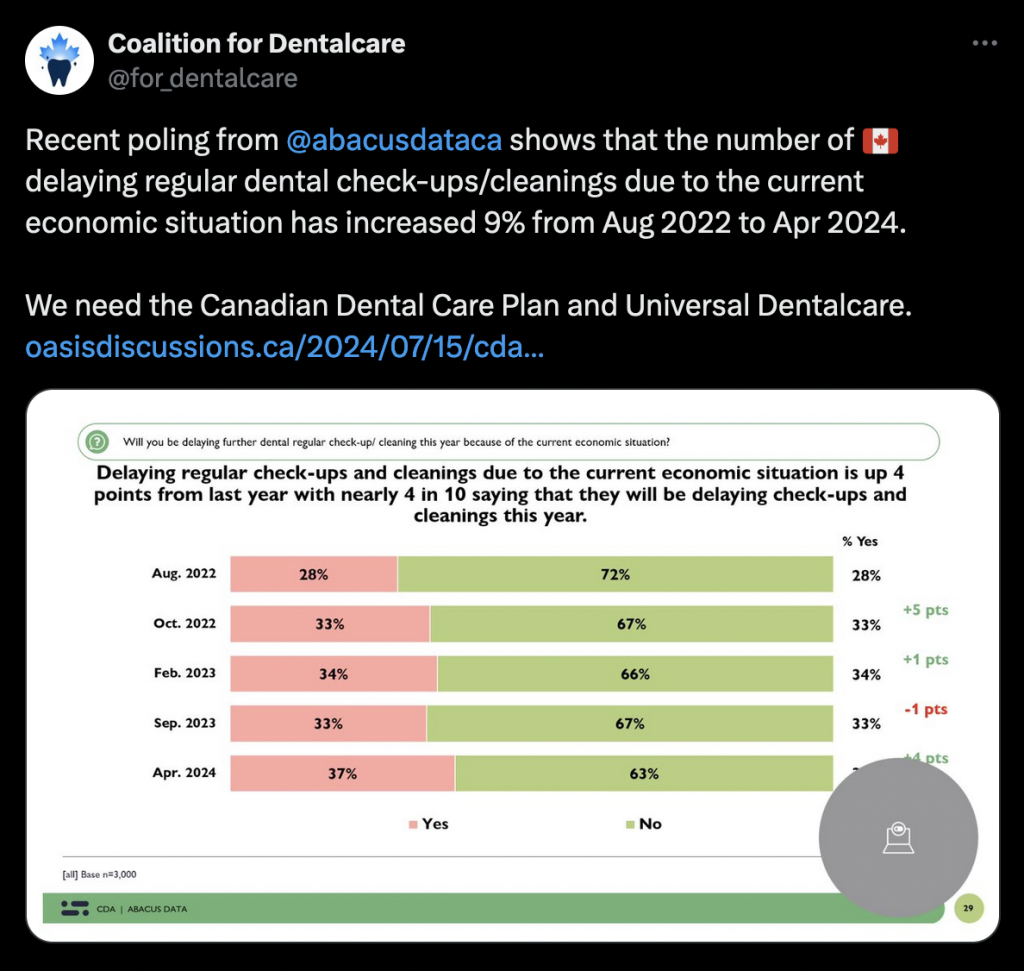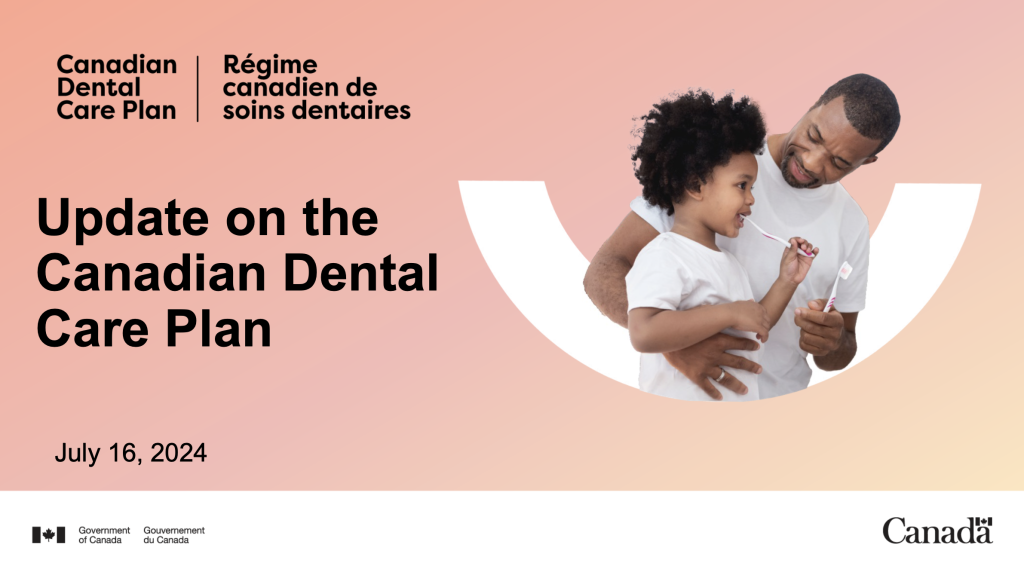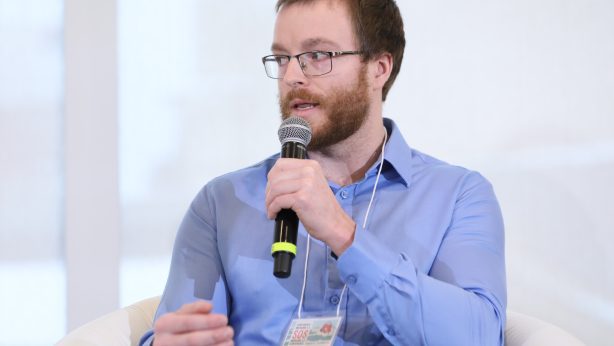“More than just a plan, it is a lifeline,” says denturist about the Canadian Dental Care Plan
Questions about the Canadian Dental Care Plan (CDCP) continue as the plan rolls out to cover more people in need of dental care. For Health Canada and the dental care providers presenting at a webinar hosted by the Canadian Health Coalition’s Anne Lagacé Dowson on July 16, it is critical that the dental care profession support the CDCP. The webinar addressed several questions from patients and providers and is now available for viewing here –
Webinar: Health Care With Teeth, Part 4: An Update on the Canadian Dental Care Plan, July 16, 2024
Dr. Brandon Doucet, a dentist, founder of the Coalition for Dentalcare and author of About Canada: Dental Care (Fernwood), moderated the panel. He reminded the audience that Canada lags behind other OECD nations on public dental spending. “As a result, over one in three Canadians lack dental insurance and around one in four avoid the dentist each year because of financial constraints. These are problems that have been worsening as many seniors retire and lose workplace benefits. Work is also becoming increasingly precarious, leading to fewer employers providing benefits like dental insurance,” said Dr. Doucet.
Dr. Doucet referenced a recent Abacus Data poll that revealed a growing percentage of Canadians delaying regular dental checkups and cleanings due to their current economic situation, from 28 per cent in August 2022 to 37 per cent in April 2024. “This same poll found that people’s top two concerns of our dental care system are underfunding of the system by governments and increasing privatization of dental care services,” said Dr. Doucet.

Marika Nadeau, Director General of the Oral Health Branch at Health Canada, was the first to present at the webinar. She noted that the Canadian Dental Care Plan (CDCP) will help millions of Canadians who before could not afford to get dental care. “I’m happy to tell you that as of now nearly 2.2 million Canadians have been approved under the plan and close to 300,000 seniors have already received care,” said Nadeau.

View Nadeau’s presentation here et en français ici.
To ensure the smooth roll out of dental care for potentially nine million Canadian residents, Nadeau said the CDCP is being rolled out in phases. Online applications are now open for seniors who are 65 years and older, adults with a valid federal disability tax credit certificate, and children under 18. All remaining eligible Canadian residents will be able to apply online in 2025.
To qualify for the CDCP, applicants must meet four eligibility criteria: They must not have access to dental insurance; they must have a family net income of less than $90,000; they must be a Canadian resident for tax purposes; and they must have filed their taxes in previous years.
Nadeau emphasized that Health Canada is making it easier for dental care providers to treat CDCP patients. Providers can either sign up through Sun Life as many providers have done since March 2024 or they can now submit claims directly to Sun Life for payment on a claim-by-claim basis.
“As of July 11, 2024, there are more than 12,000 providers who have formally signed up through Sun Life and that number continues to grow every day,” said Nadeau. These providers include 9,576 dentists and dental specialists, 1,693 denturists and 794 independent dental hygienists. Additional providers have started to submit claims on a claim-by-claim basis like they do for other insurance plans.
Recent media stories have pointed to a high demand for the CDCP but an initial slow uptake and hesitancy from the dentists willing to see CDCP patients.
Dr. Terry Shaw, a 77-year-old dentist in New Brunswick, is supportive of the CDCP. He told CBC in May, “I’m in a rural area in Perth Andover and we have a lot of seniors here in the area, and a lot of them are living on fixed incomes — $10,000 to $12,000 pensions — and, you know, dentistry is just out of the picture for them, price-wise… It’s nice when you can look at somebody’s mouth and examine it and not have that limitation of finances looking over your head.”
Dr. Melvin Lee is an Ottawa-based dentist publicly speaking out in favour of the CDCP. At the webinar, he dispelled some of the misinformation circulating about the CDCP such as the possibility of decreased or delayed remuneration. “Since the first patients that I saw in May, I have been receiving payment through Sun Life within 48 hours of the patient being seen in my clinic,” said Dr. Lee.
Dr. Lee shared his personal story of deciding to become a CDCP provider to the audience of dental care providers and patients: “I was the son of not well-to-do Korean immigrants. We didn’t have dental insurance nor did we have extra money for regular dental visits. Before I entered dental school in 1998, I went to the dentist twice in my lifetime… Finding out that about 25 per cent of Canadians, before the start of the CDCP program, could not access a dentist because of lack of money or lack of dental insurance, for me, that’s the raison d’être of why I have chosen to become a CDCP provider.”
Shannon Maitland is a registered dental hygienist who operates the Ottawa-based Oral Wellness, a mobile dental hygiene vehicle designed to bring dental hygiene care to patients including in their homes, workplaces, schools or long-term care facilities.
“The Canadian Dental Care Plan is not just about dental coverage, it’s about changing lives and ensuring or oral health care is accessible to all Canadians,” Maitland said to the webinar audience.
Maitland said the CDCP has allowed her patients on fixed incomes to receive “treatment they need without having to sacrifice life essentials like water, electricity and food.”
For Maitland, routine dental care is about saving lives: “Through assessments like blood pressure screenings and oral cancer screenings, we have the opportunity to save lives.” Maitland shared stories of referring her CDCP patients to doctors upon identifying early signs of cardiovascular and thyroid disease, and cancer.
The final panelist, Jaro Wojcicki Jr., a denturist from Penetanguishene, Ontario, and current president of the Denturist Association of Canada, shared the impact that the CDCP has had on his patients.
“Many of my patients have long struggled with the harsh realities of financial barriers to dental care. Imagine wearing dentures, the same ill-fitting dentures and worn dentures for over 40 years because new ones were simply out of reach. This is something I see every day. For these individuals the simple act of eating, speaking and smiling without pain or embarrassment seemed like a distant dream. However, the CDCP has turned that dream into a reality and I have the privilege of witnessing this transformation firsthand… When they learned that they could finally receive these new dentures without the financial burden, the relief and joy on their faces was indescribable. They could eat their favourite foods again, speak without discomfort and smile with confidence,” said Wojcicki.
“As denturists, we have embraced the CDCP with open arms across Canada. Whether we accept the CDCP fees or choose equal billing, our primary focus remains unwavering to provide much needed care to our patients. These programs has united us in our mission to enhance oral health care accessibility and delivery. It is very heartening to see the entire profession come together for a common cause that benefits so many. The CDCP is more than just a plan. It is a lifeline,” said Wojcicki.
Not everyone supports the CDCP as noted by one audience member. In June, Alberta Premier Danielle Smith wrote Prime Minister Justin Trudeau to say the province would officially opt out of the Canadian Dental Care Plan by 2026. For Dr. Doucet, “This would be very harmful to regular people in Alberta… All of the provincial programs are of much lower quality than the Canadian Dental Care Plan. They cover fewer people because of more restrictive income cut-offs, they cover fewer procedures and the fees are lower than the Canadian Dental Care Plan so in every way this program is better.”
Another audience member noted the Canadian Dental Association has been saying two out of three Canadians have dental insurance. Dr. Doucet responded, “That doesn’t mean two thirds of people have access to dental care because often times with insurance, people still can’t afford the co-payments… even the idea that 86 per cent of Canadians have visited a dentist within the past two years, that doesn’t mean they have access to routine care.”
Dr. Lee wants more compassion from oral health care providers. He added, “Numbers and statistics are one thing but when you actually see many patients coming into your dental chair with multiple missing teeth, multiple teeth with large lesions, infections, rampant uncontrolled periodontal disease… Many of these patients have been suffering with pain, abscess and infection for not days or months, for some of them, for years.”
Wojcicki, the denturist on the panel, described a similar situation of what lack of access to dentures looks like. He said his patients generally either have no teeth or they have very worn-out dentures. “Nobody’s looked in their mouth, not a medical doctor, dentist, dental hygienist, nobody for decades. These patients are finally coming in, not only to finally get a new denture but to have somebody look in their mouth,” said Wojcicki.
“It takes a level of humility for us to put ourselves in the shoes of people unable to access dental care,” added Dr. Doucet. “We should be looking at our fellow community members who are unable to access care and be outraged… as if one of our family members were in that situation.”



